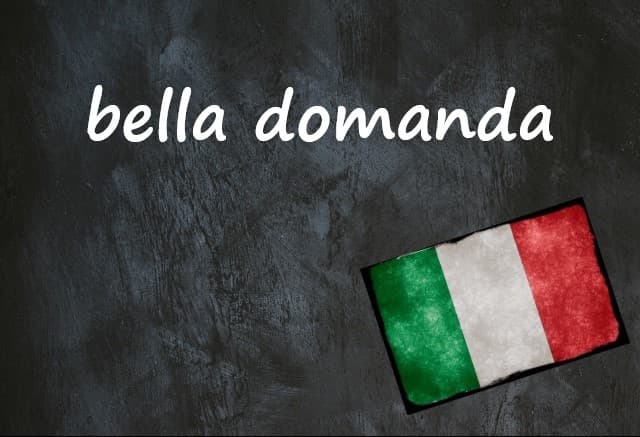Italian expression of the day: 'Bella domanda'

If you've moved to Italy, chances are you have plenty of these.
Anyone who spends much time in Italy will soon have a few questions. For example:
Is that office ever open? Have these drivers got a death wish? And why, exactly, are there so many different types of spaghetti in the supermarket?
And if you move here and start trying to make sense of certain aspects of everyday life, today's phrase is one you'll start hearing more often than you'd like.
- Che documenti servono per pagare il bollo?
- Bella domanda
- Which documents do I need to pay the tax?
- Good question
Especially when it comes to bureaucracy, rules, or any sort of timetable, you might find that most Italians are often as stumped as we foreigners are - though no doubt they'll be more confident about asking the person stood next to them, or slowing down the car to shout their query in the direction of a nearby stranger.
So don't be surprised if people respond (or stall for time) by saying "good question", just as we do in English.
You'll note that bella domanda may be used rather than buona domanda, particularly when no one knows the answer.
While both are correct, there's a slight difference in the meaning.
Bella domanda sounds as though it would translate as 'beautiful question', or 'nice question', but the adjective bella here means that the question is a big one - as in, a bit too much for the person you're asking to handle.
Depending on tone and context, it might even be used to mean it's a "hell of a question".
- È una bella domanda, e al momento siamo piuttosto occupati
- That's a hell of a question, and we're a little busy right now
If they say buona domanda, they could be remarking more on the fact that your question is clever, fair, or interesting.
Very simply put, this is because the adjective buona is usually used to remark on the positive 'internal' qualities of someone or something, while bella is more for commenting on appearances, and as in this case, can also be used to add emphasis (much as we might use 'nice' in English:)
- Un bel lettone
- A nice, big bed
(Here's some more detail on the usage and different spellings.)
Other common Italian responses to what friends call my mille domande (thousand questions) include:
- dipende da chi trovi
- It depends on who you ask (literally, find)
- Boh! Vediamo.
- Who knows? We'll see...
Do you have an Italian word you’d like us to feature? If so, please email us with your suggestion.
Comments
See Also
Anyone who spends much time in Italy will soon have a few questions. For example:
Is that office ever open? Have these drivers got a death wish? And why, exactly, are there so many different types of spaghetti in the supermarket?
And if you move here and start trying to make sense of certain aspects of everyday life, today's phrase is one you'll start hearing more often than you'd like.
- Che documenti servono per pagare il bollo?
- Bella domanda
- Which documents do I need to pay the tax?
- Good question
Especially when it comes to bureaucracy, rules, or any sort of timetable, you might find that most Italians are often as stumped as we foreigners are - though no doubt they'll be more confident about asking the person stood next to them, or slowing down the car to shout their query in the direction of a nearby stranger.
So don't be surprised if people respond (or stall for time) by saying "good question", just as we do in English.
You'll note that bella domanda may be used rather than buona domanda, particularly when no one knows the answer.
While both are correct, there's a slight difference in the meaning.
Bella domanda sounds as though it would translate as 'beautiful question', or 'nice question', but the adjective bella here means that the question is a big one - as in, a bit too much for the person you're asking to handle.
Depending on tone and context, it might even be used to mean it's a "hell of a question".
- È una bella domanda, e al momento siamo piuttosto occupati
- That's a hell of a question, and we're a little busy right now
If they say buona domanda, they could be remarking more on the fact that your question is clever, fair, or interesting.
Very simply put, this is because the adjective buona is usually used to remark on the positive 'internal' qualities of someone or something, while bella is more for commenting on appearances, and as in this case, can also be used to add emphasis (much as we might use 'nice' in English:)
- Un bel lettone
- A nice, big bed
(Here's some more detail on the usage and different spellings.)
Other common Italian responses to what friends call my mille domande (thousand questions) include:
- dipende da chi trovi
- It depends on who you ask (literally, find)
- Boh! Vediamo.
- Who knows? We'll see...
Do you have an Italian word you’d like us to feature? If so, please email us with your suggestion.

Join the conversation in our comments section below. Share your own views and experience and if you have a question or suggestion for our journalists then email us at [email protected].
Please keep comments civil, constructive and on topic – and make sure to read our terms of use before getting involved.
Please log in here to leave a comment.